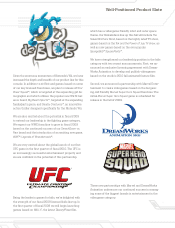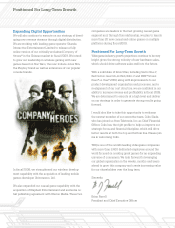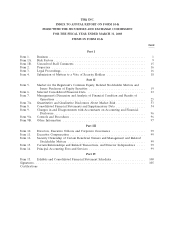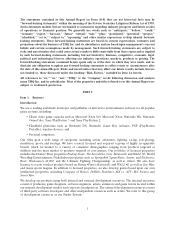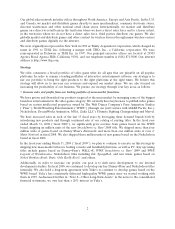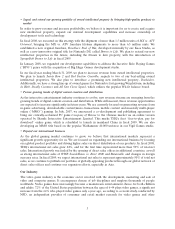THQ 2008 Annual Report Download - page 15
Download and view the complete annual report
Please find page 15 of the 2008 THQ annual report below. You can navigate through the pages in the report by either clicking on the pages listed below, or by using the keyword search tool below to find specific information within the annual report.Platform License Agreements
Before we can develop, market, or sell video games on a console or handheld platform, we must enter into
a license agreement with the manufacturer of such platform. The current ‘‘platform manufacturers’’ are
Microsoft, Nintendo and Sony. Each of these platform license agreements allows us a non-exclusive right
to use, for a fixed term, technology that is owned by the platform manufacturer. As each platform license
expires, if we intend to continue publishing games on such platform, we must enter into a new agreement
or an amendment with the licensor to extend the term of the agreement. Certain agreements, such as the
licenses with Sony and Microsoft for PlayStation 3 and Xbox 360, respectively, automatically renew each
year unless either party gives notice by the applicable date that it intends to terminate the agreement.
Additionally, each agreement designates a territory in which we can publish and distribute titles. We are
currently licensed to develop and publish titles on all platforms that are currently sold in North America.
Our key platform licenses also allow us to develop and publish titles in Europe, Australia, New Zealand
and Japan. We are also licensed to develop and publish titles for PlayStation 2, Xbox and Xbox 360 in
various additional territories, including parts of Asia and Central and South America. We expect to enter
into additional platform licenses and extend current licenses as new platforms are launched or our current
agreements expire.
Our platform licenses require that each title be approved by the manufacturer. The manufacturers have
the right to review, evaluate and approve a prototype of each title and the title’s packaging and marketing
materials. Once a title is developed and has been approved by the manufacturer, the title is manufactured
solely by such manufacturer or a designated vendor of the manufacturer. The licenses establish the
payment terms for the manufacture of each cartridge or disc made, which generally provide for a charge
for every cartridge or disc manufactured. The amounts charged by the manufacturers for both console
discs and handheld cartridges include a manufacturing, printing and packaging fee as well as a royalty for
the use of the manufacturer’s name, proprietary information and technology, and are subject to adjustment
by the manufacturers at their discretion.
The platform license agreements also require us to indemnify the manufacturers with respect to all loss,
liability and expense resulting from any claim against the manufacturer involving the development,
marketing, sale, or use of our games, including any claims for copyright or trademark infringement brought
against the manufacturer. Each platform license may be terminated by the manufacturer if a breach or
default by us is not cured after we receive written notice from the manufacturer, or if we become insolvent.
Upon termination of a platform license for any reason other than our breach or default, we have a limited
period of time to sell any existing product inventory remaining as of the date of termination. The length of
this sell-off period varies between 90 and 180 days, depending upon the platform agreement. We must
destroy any such inventory remaining after the end of the sell-off period. Upon termination as a result of
our breach or default, we must destroy any remaining inventory within a minimum number of days as
specified by the manufacturer.
Seasonality
The interactive entertainment software market is highly seasonal, with sales typically significantly higher
during the third quarter of our fiscal year, due primarily to the increased demand for interactive games
during the year-end holiday buying season.
Major Customers
Our largest customers worldwide include Best Buy, GameStop, Target, Toys ‘‘R’’ Us and Wal-Mart. We
also sell our products to other national and regional retailers, discount store chains and specialty retailers.
Wal-mart and GameStop each accounted for more than 10% of our gross sales in fiscal 2008, 2007 and
2006. A substantial reduction, termination of purchases, or business failure by any of our largest customers
could have a material adverse effect on us.
7


